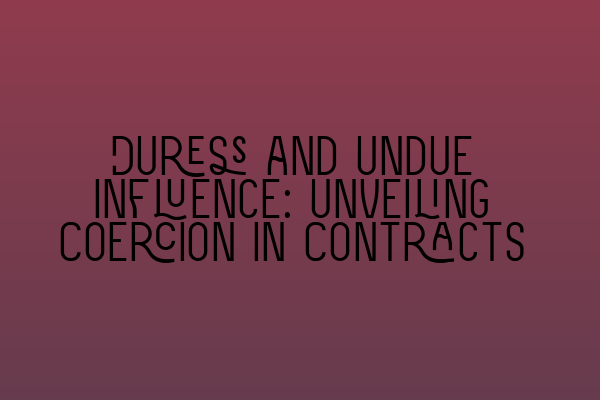Duress and Undue Influence: Unveiling Coercion in Contracts
Contracts are the backbone of business transactions, ensuring that parties involved can rely on each other to fulfill their obligations. However, contracts entered into under duress or undue influence can significantly undermine their validity, fairness, and enforceability. In this article, we will explore the concepts of duress and undue influence in contract law, shedding light on the coercion that can occur and the legal implications it entails.
Understanding Duress in Contract Law
Duress, in the context of contract law, refers to situations where one party forces or compels the other party to enter into a contract against their will. This coercion can take various forms, including physical threats, economic pressure, or emotional manipulation. When duress is present, it vitiates the consent of the innocent party, rendering the contract voidable at their option.
Examples of duress can range from a supplier threatening to cut off essential goods unless the buyer agrees to unfavorable terms, to a party threatening violence if a contract is not signed. Regardless of the form it takes, duress is a serious offense and can have severe legal consequences.
If a contract is entered into under duress, the affected party may choose to seek remedies such as rescission (canceling the contract), restitution (returning both parties to their pre-contractual positions), or damages (compensation for any losses suffered due to the duress).
For a comprehensive understanding of the impact of frustration on contractual obligations, you can read our related article on Exploring the Impact of Frustration on Contractual Obligations: Legal Insights.
Unveiling Undue Influence in Contract Law
Undue influence occurs when one party exerts excessive pressure or influence over another party, resulting in the imbalance of bargaining power and the other party’s inability to exercise their free will. This imbalance can arise from relationships of trust or confidence, such as those between family members, friends, or parties with significant financial disparities.
Unlike duress, undue influence does not rely on explicit threats or coercion. Instead, it capitalizes on the vulnerability of the influenced party and manipulates their judgment and decision-making abilities. Common examples of undue influence include situations where a caregiver persuades an elderly person to change their will in favor of the caregiver or when a senior executive uses their authority to influence an employee into signing an unfair employment contract.
If a contract is found to be entered into under undue influence, it can be set aside or modified by the court. The court may also order restitution or equitable remedies to restore the parties to a fair and just position.
To gain a comprehensive understanding of interpreting contractual clauses and unlocking their hidden meanings, check out our related article on Interpreting Contractual Clauses: Unlocking the Hidden Meanings.
The Importance of Recognizing Coercion
Duress and undue influence undermine the very essence of contract law, which is based on the principle of mutual consent and fair dealing. When a contract is tainted by coercion, it becomes inequitable and contrary to public policy.
Recognizing and addressing coercion in contracts is crucial to safeguarding the interests of parties with unequal bargaining power and ensuring fair and transparent business practices. Contracting parties, lawyers, and judges alike must be vigilant in identifying and scrutinizing contracts for signs of duress or undue influence to uphold the integrity and enforceability of contracts.
Entrepreneurs and business owners should be particularly mindful of the legal aspects of business contracts to avoid falling victim to questionable or coerced agreements. To gain insights into key considerations for entrepreneurs in contract law, read our related article Legal Aspects of Business Contracts: Key Considerations for Entrepreneurs.
SQE Contract Law: Expanding Legal Knowledge
The SQE (Solicitors Qualifying Examination) represents a new pathway for aspiring solicitors to qualify in England and Wales. SQE Contract Law is a fundamental area of study that equips future solicitors with the necessary skills and knowledge to navigate the complexities of contract law.
Comparing SQE Contract Law with traditional qualifications can provide valuable insights, ensuring prospective solicitors make informed decisions about their legal education journey. To delve deeper into this comparative analysis, read our related article SQE Contract Law vs. Traditional Qualifications: A Comparative Analysis.
In Conclusion
Duress and undue influence are two forms of coercion that can undermine the validity and fairness of contracts. Recognizing and addressing coercion is essential in ensuring that contracts truly reflect the intentions and consent of the parties involved. By being aware of the signs and legal implications of duress and undue influence, individuals and businesses can protect themselves from unfair agreements and uphold the principles of contract law.
To further explore the various types of agreements under contract law, visit our related article on Agreements in Contract Law: Understanding Its Various Types.
